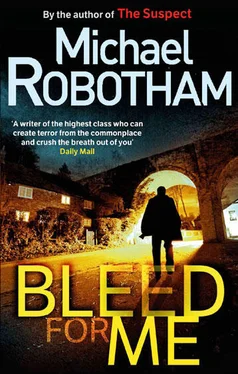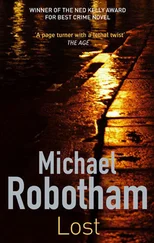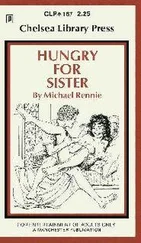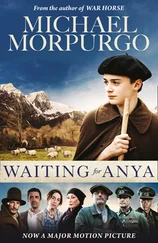‘You might be right.’ She doesn’t want an argument.
‘Do you want to remarry?’
‘No.’
‘So why?’
‘I don’t feel married any more.’
‘I do.’
Julianne pushes bracelets up her forearm. ‘Do you know your problem, Joe?’
I know she’s going to tell me.
‘You want everything to seem perfect and to seem happy and you’re willing to let “seem” equal “be”.’
Her admonishment is intimate and so laced with melancholy it leaves me nothing to say.
‘You don’t have to go home,’ she says. ‘You can sleep on the sofa.’
‘Why?’
‘Because you’re exhausted and some nights I get a little scared on my own.’
‘Scared?’
She slips her hand down my forearm and hooks her fingers under my palm. ‘I can have bad dreams too.’
My head is vibrating. The sensation comes and goes every few seconds. Opening my eyes, it takes me a moment to recognise my surroundings. I am on the sofa in the cottage.
I remember Julianne giving me a pillow and blankets, watching the news and feeling a sense of helplessness. Problems in Gaza, global warming, the credit crisis, ozone holes, soaring unemployment, casualties in Iraq and Afghanistan . . .
I don’t remember turning off the TV or the hallway light. Julianne must have decided not to wake me. I do remember dreaming of Annie Robinson’s breasts encased in a lace bra.
The vibrations begin again. My mobile phone is wedged between my head and the armrest of the sofa.
I press green. It’s Ronnie Cray.
‘Where are you?’
‘What is it?’
‘Ellis is on the move.’
My mind is issuing orders. My feet take a little longer to obey. Navigating through the darkened house, splashing water on my face, lacing my shoes. Suddenly, all thumbs, I can’t make the loops and knot the laces.
Julianne appears at the top of the stairs in a thin cotton night-dress. The light behind her paints her body in a silhouette that would make a bishop break his vows.
‘What is it?’ she asks.
‘Go back to bed. I have to go.’
‘This is what I don’t like, Joe.’
‘I know.’
Two unmarked police cars are waiting outside. Monk holds open a rear door. Ronnie Cray is inside, talking on her mobile. She hasn’t been to sleep since yesterday.
We travel in silence along Wellow Road towards Radstock and then take a series of B-roads heading west. Kieran the tech is sitting in the front passenger seat, fiddling with an earpiece and tapping on a keyboard. The surveillance vehicles are colour-coded dots on a satellite map displayed on a laptop screen.
Safari Roy over the two-way: ‘Mobile One: We’re two back, keeping visual. He’s indicating right . . . turning on to the B3135.’
‘Copy that.’
Another voice: ‘Mobile Three: I’m two miles ahead on the A39. I can take over at Green Ore.’
Sunrise is an hour away. Cray looks at her watch. ‘How soon can we get a chopper in the air?’
‘Forty minutes,’ says Kieran.
We push on through the ink-dark night, listening to the radio chatter and watching the grid lights of larger towns that dot the landscape. Still heading roughly west, we pass through Cheddar and Axbridge and dozens of small villages that appear and disappear, each looking the same.
Gordon Ellis is heading for the North Somerset coast. Every so often he pulls over and waits or doubles back for several miles before turning and resuming his journey. He’s making sure that he’s not being followed, perhaps checking number plates. Safari Roy gets worried and drops back further. A tracking device on the Ford Focus will keep us in touch as long as Ellis stays with the vehicle.
The eastern horizon is now a yellow slash and the treetops on the high ground are changing colour. The helicopter is in the air but still half an hour away. It’s another call-sign in the chorus of chatter and static on the radio.
Ellis seems to be slowing down, still turning at every roundabout and doubling back. He’s on the A38, passing under the M5. At the next roundabout he takes the second exit on to Bridgewater Road and after half a mile turns left towards Berrow and the coast. The landscape is flat and windswept, broken only by occasional villages and the Mendip Hills in the south.
Kieran points to a satellite image that shows clusters of white boxes along a six-mile beach stretching from Burnham-on-Sea to Brean Down. Caravan sites, chalet parks and holiday cabins are like miniature communities set out in grid pattern with narrow tarmac roads dividing the squares.
The tailing cars are all within a mile of each other as we follow the Coast Road through small villages touched now by a morning sun that paints the cottages in pastel colours and turns fields a brighter green.
There are caravan parks on both sides of the road, along the beachfront and spread in neat rows across fields that were once farmland. Some of the caravans have small gardens, washing lines and faded awnings. Others look closed up and packed away for the winter.
‘Is there a fairground near any of them?’ asks Cray.
‘Brean Leisure Park.’ Kieran points to the satellite image on screen, which shows up as a series of circles, spiders and snake-like rides, flattened of perspective by the angle of the camera.
The green dot on the screen continues along the Coast Road for another five hundred yards before turning left into a shopping centre. Ellis slowly circles the deserted car park and pulls up near a pathway leading from the shops to the beach.
He waits, sitting behind the wheel, watching the entrance. A motorbike passes and disappears along the road. One of ours. The other surveillance teams are hanging back.
The sun has risen above a torn ridge of clouds, bleaching the whitecaps. We’ve stopped moving and parked at the entrance to the fairground, where the rides are tethered and silent. I can hear flags and canvas beating out a rhythm in the breeze.
Minutes pass. The engine ticks over. Cray’s nerves are like guitar strings. I want to ask her about the court case. What did she decide to do? It’s not a subject we can talk about openly.
A woman is walking towards us with her dog. She has tight pink leggings and a mass of dyed black hair that matches the colour of her poodle. Crossing the road, she looks at us suspiciously.
Safari Roy on radio:
‘Target’s moving. He’s out of the car. Taking something from the boot . . . It’s a petrol container. He’s on foot.’
‘Where?’
‘Heading down the beach track.’
‘Stay put. He could double back.’
‘Mobile Two: I have visual contact.’
‘Don’t get too close.’
Cray is sick of looking at dots on a screen. She wants to be outside, on foot, closer.
‘Mobile One: Target’s on the beach.’
‘Mobile Two: I’ve lost visual . . . no, I see him again.’
‘Copy that.’
‘Mobile Three: I’m staying at the car.’
‘Where’s the chopper?’ asks Cray.
Kieran answers, ‘Eight minutes away.’
‘You still with him, Roy?’
‘I got him.’
‘What’s he doing?’
‘He’s cutting over the dunes, back towards the road. You should see him in about ten . . . five . . .’
‘Mobile Two: He’s walking between ’vans.’
Cray over the radio: ‘Nobody move until he identifies the van.’ Then she taps Monk on the shoulder. ‘Get us closer.’
Pulling on to the Coast Road, we travel a hundred yards and turn into a driveway. The other cars are closing in, sealing off the entrances to the caravan park. I catch a brief glimpse of Ellis about sixty yards away, walking between caravans. A hooded sweatshirt covers his head. One hand is in the pocket of his dark jeans. The other holds an orange petrol container. He stops, crouching on his haunches, scanning the park, but his gaze returns to a particular ’van.
Читать дальше












